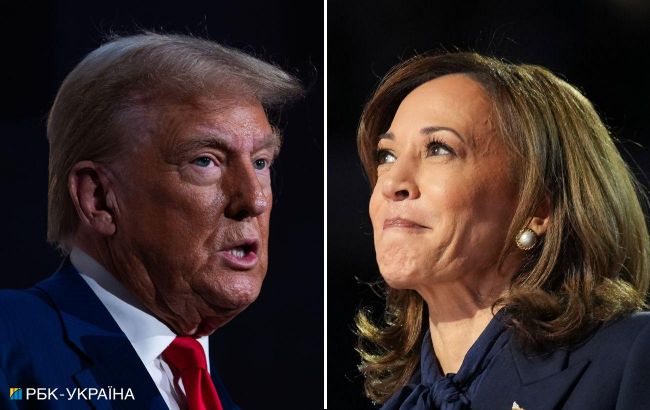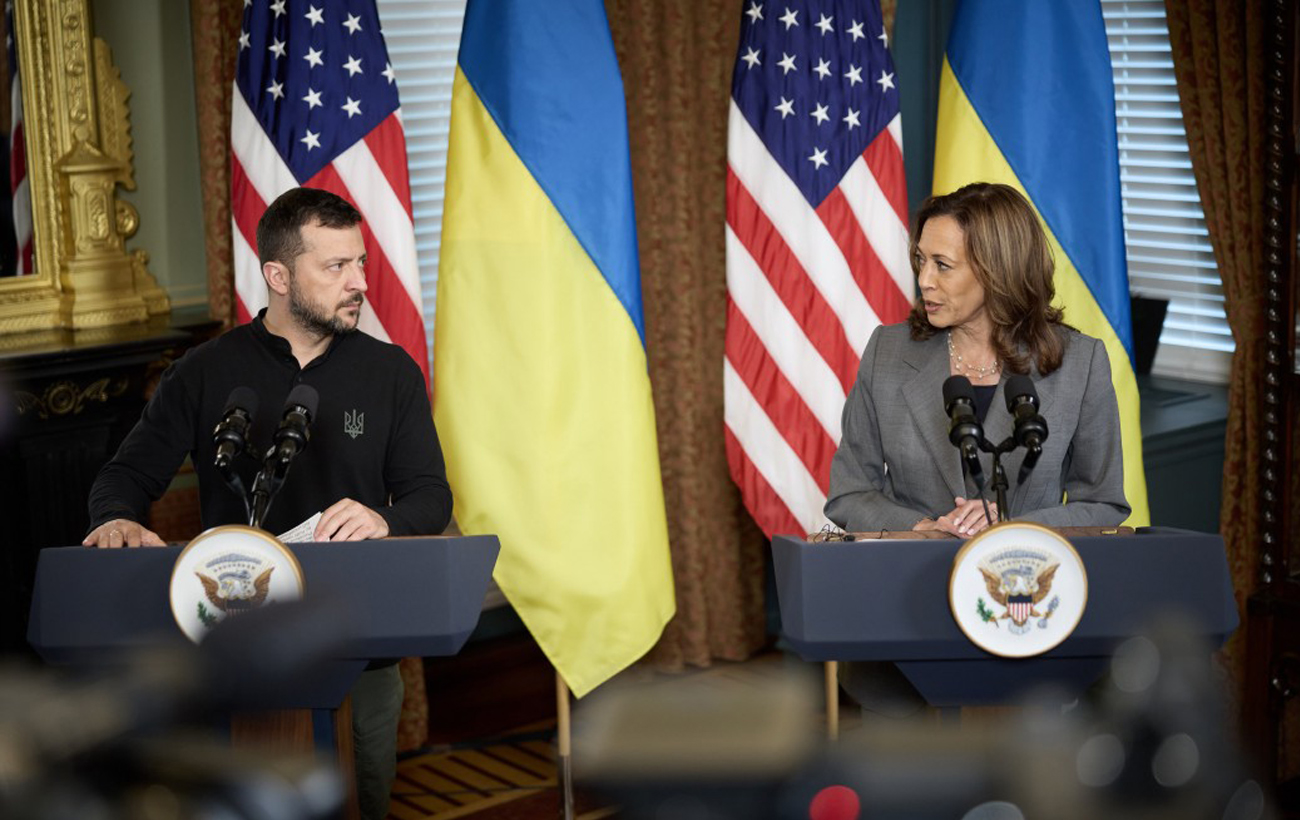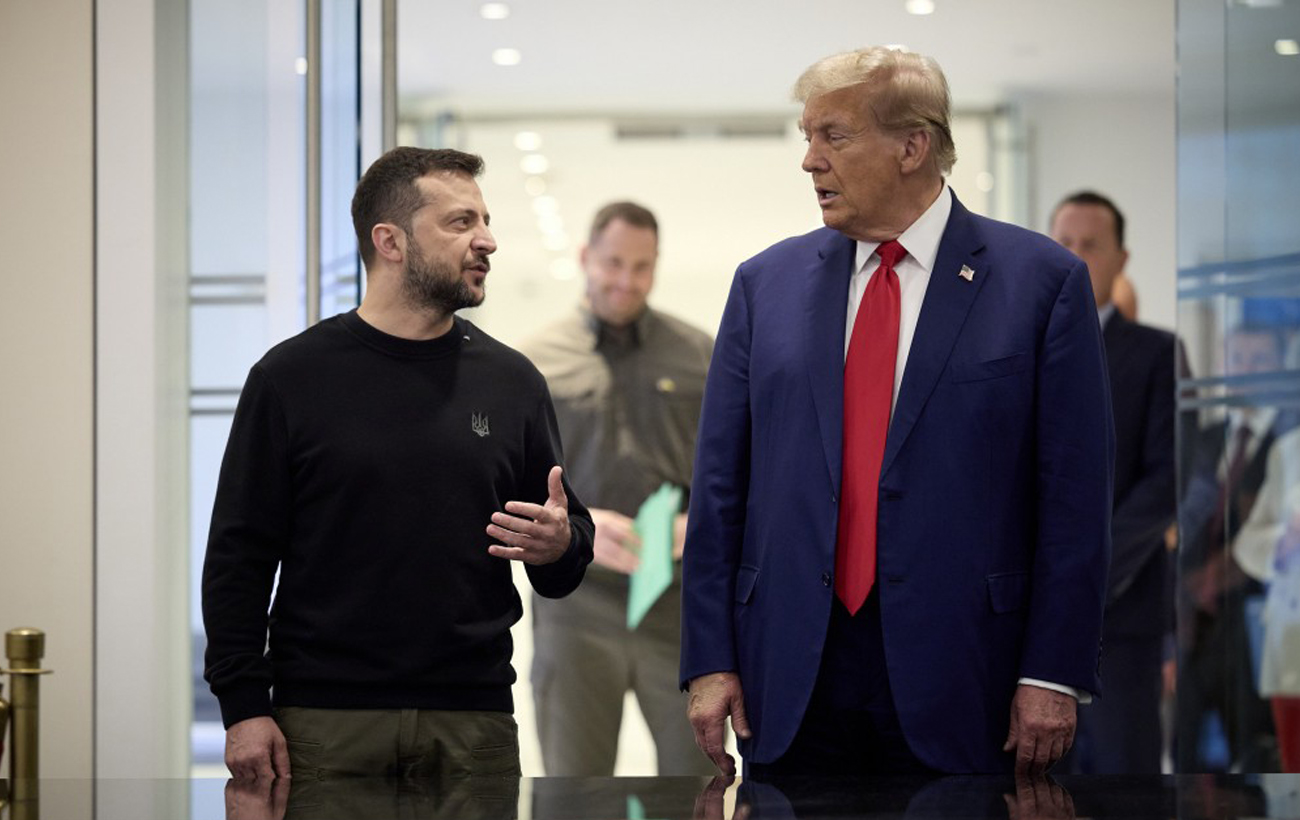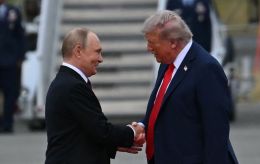Harris or Trump? What US election results mean for Ukraine
 Photo: Donald Trump and Kamala Harris (RBC-Ukraine collage)
Photo: Donald Trump and Kamala Harris (RBC-Ukraine collage)
The US election will take place tomorrow, November 5, 2024. The outcome will determine whether military support for Ukraine continues or if the main partner insists on negotiations with the Kremlin at the expense of its interests.
For more details on what to expect from the potential presidencies of Kamala Harris or Donald Trump, how US Ukrainian policy might change, and when these changes could occur, read the material by RBC-Ukraine.
Contents:
- Harris's position and what her victory could mean for Ukraine
- Trump's position and potential impact if elected President
- Assessing the risks for Ukraine and when to expect changes in US policy
Harris's position and what her victory could mean for Ukraine
Kamala Harris promises strong support for Ukraine in its fight against Russian aggression and has been critical of Vladimir Putin. At the Munich Security Conference in February, she condemned the delays in military aid from Congress, stating that such a situation would be a gift to the aggressor.
"History proves that when we do not react when an aggressor invades its neighbor with impunity, it will continue to move on. And in Putin's case, this means that the whole of Europe will be under threat," she explained.
At the first Peace Summit in Switzerland, Vice President Harris represented the United States, emphasizing the need to hold the aggressor accountable. Otherwise, she warned, it would encourage other aggressors and lead to new wars.
During her meeting with President Volodymyr Zelenskyy in September, she stressed that no issues regarding the war could be resolved without Ukraine's involvement. She also pointed out that some in the US are attempting to persuade Ukraine to make territorial concessions, clearly referring to Donald Trump.
"These proposals are the same as those of Putin. And let us be clear: they are not proposals for peace. Instead, they are proposals for surrender, which is dangerous and unacceptable," Harris said, adding that Putin could quickly end the war by withdrawing his troops.

Photo: Kamala Harris shares Volodymyr Zelenskyy's vision of ending the Russian-Ukrainian war (president.gov.ua)
Overall, she stated that she shares President Zelenskyy's vision for ending the war, although she did not make specific statements regarding Ukraine's victory plan. In a debate with Trump, she accused her opponent of cozying up to the dictator, claiming that he would surrender in 24 hours rather than end the war.
"What you think is a friendship with what is known to be a dictator, who would eat you for lunch," Harris said, emphasizing that "Putin would be sitting in Kyiv" under Trump.
She has clearly articulated her desire to see Russia defeated and promised to continue Joe Biden's policy of providing assistance to Ukraine.
These are rational expectations, as Harris is still part of the current administration, explains Vladyslav Faraponov, CEO of the Institute of American Studies and analyst at Internews Ukraine.
"But to confidently assert this, more specificity is needed, both from her and regarding who might occupy key positions in her administration. Many in Washington are paying attention to this now. It's one thing who becomes president; it's another who becomes advisors and so on," he told RBC-Ukraine.
However, it's not as simple with Kamala Harris as it seems. She is more predictable and more institutional (willing to work within established contacts), but the lack of a clear foreign policy strategy could pose a problem, says Oleksander Kraiev, an expert at the Foreign Policy Council Ukrainian Prism.
"All of this could lead to a certain passivity and an even more cautious foreign policy. In the case of Ukraine, this is as detrimental as Trump's chaotic approach. Clearly, under her, the US will continue its support. But will we get a really decisive position, new solutions and qualitatively new support? That's the question," he believes.
Trump's position and potential impact if elected President
Donald Trump questions the necessity of aid to Ukraine, stating that Europe should bear the main burden. He has repeatedly avoided answering whether he wants Ukraine to win but has claimed that if elected, he would quickly end the war - before his inauguration in January 2025.
In April, Trump stated that he is open to providing assistance to Ukraine through loans, similar to the Lend-Lease program the US initiated during World War II for its allies. However, he has said little about how he plans to end the war.
He might attempt to push Putin toward negotiations, and if Putin refuses, he would increase support for Ukraine. At the same time, he is prepared to pressure Zelenskyy. He stated that he would tell Zelenskyy that he needed to make a deal, and he would tell Putin that if he didn’t make a deal, the US would give Ukraine more than ever before. He is confident that he will be able to reach an agreement in one day.
At a September rally in North Carolina, he criticized Zelenskyy, claiming the Ukrainian leader had rejected a deal that could have prevented the destruction of Ukraine. "Any deal — the worst deal — would’ve been better than what we have now," said the Republican candidate. He added that Ukraine is "demolished".
He refers to the Ukrainian leader as the greatest salesman in history, suggesting that Zelenskyy leaves the US each time with billions of dollars. Trump also promises to extricate America from the war and quickly conclude it with phone calls.
One of his proposed methods includes lowering energy prices. He believes that if oil prices drop to $40 per barrel, it would drastically reduce the flow of oil dollars and hinder Putin's ability to continue fighting.
Trump has repeatedly noted his good relationship with Putin, and during his meeting with Zelenskyy, he remarked similarly about the Ukrainian leader. He also stated the need for a fair deal for everybody and added that he learned a lot from talks with Zelenskyy, who presented a victory plan.

Photo: Donald Trump spoke of a fair deal for everybody at his meeting with Zelenskyy (president.gov.ua)
Based on Trump's advisors, American media reports that his "fair deal" may involve freezing the war and establishing autonomous regions on both sides of a demilitarized zone. Additionally, Ukraine would be pressured to abandon its NATO membership, rethink previous Minsk agreements, and wait until Putin is gone.
It's hard to say whether his policy would be like this. First, he is capable of unpredictable actions. Second, if he becomes president, he will have the authority to significantly strengthen Ukraine, according to Faraponov.
"But we still haven’t heard the main question from him. Is he ready to pressure Putin? And if he is, to what extent and at what cost?" the interlocutor noted.
Trump's intentions can be judged by his fundamental narratives, which are so contradictory that they suggest one thing: his policy will be shaped solely by his own visions and will literally depend on his mood on any given day, says Kraiev.
"It’s a confirmed fact that he will push us towards negotiations. And those negotiations will be in the format of 'let's agree not to shoot, let's stop everything as it is, and conditionally start a new Minsk process.' This doesn’t mean he will stop aid during negotiations. On the contrary, he has said he could provide more weapons. The situation in this context is not clearly defined," the expert believes.
Assessing the risks for Ukraine and when to expect changes in US policy
Donald Trump and Kamala Harris present Ukraine with two completely different future options, writes The New York Times. It’s almost certain that they will shape US policy differently depending on who wins the election.
Trump seems interested in a deal that may come at Ukraine's expense. Harris appears more predictable, but continuing the current US administration's policy with a fear of direct confrontation with Moscow will likely mean that responses to new challenges may be delayed.
Considering who is less risky for Ukraine is inappropriate, as the American people elect the president. It is more relevant to analyze who poses more risks.
"Harris is less risky. Yes, she may take fewer decisive actions, but we know how to work with her and what to expect. With Trump, it’s either all or nothing. Either he supports us and helps us win, or he is against us, and then we will have a hard time," explains Oleksandr Kraiev.
Vladyslav Faraponov emphasizes that Ukraine needs to work with both parties in both houses of Congress and prepare for any scenario. This applies to both the presidential election and congressional elections.
"Should we expect decisions from the elected president immediately after November 5? I think there won't be significant decisions in the classical sense. There will be hints directed at Ukraine, and there will be an opportunity during the transition of power to prepare for new scenarios. As for Trump's statements about 'ending the war' before taking office, I think some informal steps could be taken. But assessing the realism of this plan is difficult right now," the analyst said.
In Kraiev’s opinion, Ukraine will start feeling the results of the US elections after the inauguration on January 20.
"We see a primary focus of our diplomacy on the fact that while Biden still has a mandate, he will not be bound electorally or politically, so that he can intensify our support, the issue of NATO accession, and long-range weapons during this period. We need to maximize what we can achieve in the 76 days between November 5 and January 20. With the new presidential administration, we may begin working possibly from late December," concluded the interlocutor.
Experts interviewed by the American media outlet Breaking Defense believe that Trump could shift US policy towards isolationism, leading to a sharp reduction in military spending. Although promises to restore peace in Europe and the Middle East do not correlate with threats to effectively force Ukraine to capitulate to Russia.
Trump's pre-election statements, for example, about withdrawing from NATO or his stance on Ukraine, may remain just words. However, plans to cut military aid are likely to be realized. Elon Musk could further add to the uncertainty, as he is likely to head a new department for government efficiency if Trump wins. He has already promised to cut $2 trillion from the $7.3 trillion federal budget for 2025.
On the other hand, if Harris takes the White House, we shouldn't expect changes in US military policy. She has repeatedly stated that she will ensure the military maintains its status as the strongest and deadliest fighting force in the world, as well as victory over China in the technological race. Harris also promises to stand by Ukraine, which means providing necessary military assistance.
Sources: statements by Donald Trump and Kamala Harris, publications by The New York Times and Breaking Defense, comments by Vladyslav Faraponov, head of the Institute of American Studies, analyst at Internews Ukraine, and Oleksandr Kraiev, expert at the Foreign Policy Council Ukrainian Prism.

